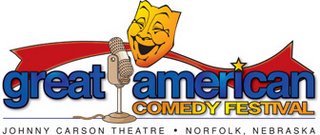Seven Days Without Laughter Makes One Weak

by LuAnn Schindler
What happens when you go a day without laughing? C'mon, be honest. You can't do it. Even in the darkest of times, something triggers a reaction that causes us to laugh, even if the laughter is expressed only inside us.
For the next seven days, I'm embarking on a journey with 10 students as they discover their inner humorist, define their improvisation techniques, and develop humorous writing skills. It's part of the Great American Comedy Festival, a week-long festival saluting the best in the world of comedy, live from the hometown of Johnny Carson.
The great part of being the director of the comedy camp is that I, too, get to learn about techniques of comedic timing from our renowned instructors: Second City and the San Francisco Comedy College.
For writers, humorous writing tends to concentrate on creative essays or clever articles that provide that moment where readers utter "Ha!". But those of us who write humor articles can learn a thing or two by expanding our repertoire and stepping outside our comfort zone. Consider taking a class in stand up comedy, where the structure of a joke is explained. It really can help when you're writing that punch line in an essay. What about sketch writing? Sure, you may not end up being showcased on a comedy channel, but sketch writing teaches you to bring unlikely elements together in a format that makes sense. And those are techniques ALL writers can benefit from.
This week will undoubtedly create multiple cackles, produce several snickers, and generate many guffaws. I've got to get my suitcase packed. I don't want to miss a minute, because seven days without laughter makes one weak.
Labels: comedy, comedy classes, comedy writing, Great American Comedy Festival, LuAnn Schindler, san francisco comedy college, second city, sketch comedy, standup comedy











